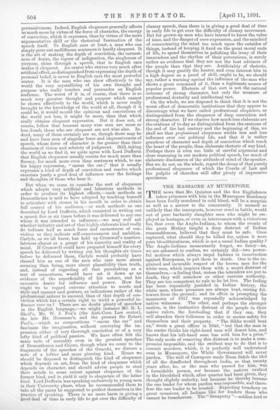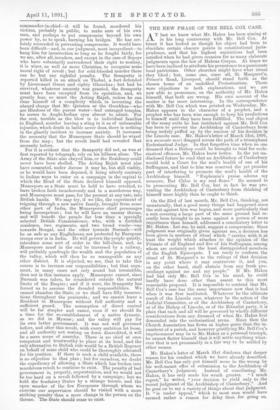THE MASSACRE AT 1VIUNEEPORE.
?THE news that Mr. Quinton and the five Englishmen taken prisoners with him in the Muneepore Residency have been foully murdered in cold blood, will be a surprise as well as a sorrow to the community. It seemed so unlikely that the insurgents, however cruel in battle, would out of pure barbarity slaughter men who might be em- ployed as hostages, or even as intercessors with a victorious foe, that even the Anglo-Indians, to whom the events of the great Mutiny taught a deep distrust of Indian reasonableness, believed that they must be safe. Once captured, what should they be killed for, unless it were pure bloodthirstiness, which is not a usual Indian quality ? The Anglo-Indians momentarily forgot, we fancy—as, we are ashamed to confess, we certainly did—two power- ful motives which always impel Indians in insurrection against Europeans, to put them to death. One is the in- grained and incurable respect of the brown men for the white men, which inspires them with a secret distrust of themselves,—a feeling that, unless the intruders are put to death, they will somehow or other exercise authority. They are too competent to rule to be let live. The feeling has been repeatedly justified in Indian history, the white men, whose promises are always kept, raising fol- lowers from the ground ; and its effect in prompting the massacres of 1857 was repeatedly acknowledged by native witnesses. The other, and perhaps the stronger motive, is the instinctive distrust of the people in their native rulers, the foreboding that if they can, they will abandon their followers in order to secure safety for themselves and their property. "The Sikhs would beat us," wrote a great officer in 1848, "but that the man in the centre thinks his right-hand man will desert him, and. knows that his left-hand man has sold him for a price." The only mode of removing this distrust is to make a com- promise impossible, and the swiftest way to do that is to commit murders, which, it is perfectly well understood even in Muneepore, the White Government will never pardon. The well of Cawnpore made Nana Sahib the idol of all the disaffected throughout India, so that twenty years after, he, or the man who passed for him, was a formidable person, not because the natives exulted in the bloodshed which, after quarter had been given, they thought slightly unlucky, but because he thereby became the one leader for whom pardon was impossible, and there- fore the one leader to be trusted. Expecting treachery on great occasions, all Indians like for leaders those who cannot be treacherous. The" Seuaputty "—soldier-lord or commander-in-chief—it will be found, murdered his victims, probably in public, to make sure of his own men, and perhaps to put compromise beyond his own power by, so to speak, burning his bridges. He has cer- tainly succeeded in preventing compromise. It would have been difficult—and, in our judgment, most inexpedient—to hang him for insurrection so long as he fought fairly, for we are, after all, invaders, and except in the case of Sepoys who have voluntarily surrendered their right to mutiny, it is wiser, as well as more Christian, to recognise some moral right of revolt ; but for cold-blooded murder there can be but one rightful penalty. The Senaputty is reported killed in an attack on Thobal, a fort defended by Lieutenant Grant and eighty Ghoorkas ; but had he survived, whatever amnesty was granted, the Senaputty must have been excepted from its operation, and, we greatly fear, so must the Acting Rajah, unless he can clear himself of a complicity which, in inventing the absurd charge that Mr. Quinton or the Goorkhas—who are Hindoos of the purest water—had outraged temples, he seems to Anglo-Indian eyes almost to admit. For the rest, terrible as the blow is to individual families in England, murder leaving a sting in it as of unbearable injustice, which death in battle never does, there is nothing in the ghastly incident to increase anxiety. It increases the necessity that the Muneepore State should be wiped from the map ; but the revolt itself had. revealed that necessity before. For it is evident that the Senaputty did not, as was at first reported by telegraph, rely on his hillmen alone. The Army of the State also obeyed him, or the Residency could never have been shelled. The Acting Rajah must also have consented, under duresse it may be, but still visibly, or he would have been deposed, it being utterly contrary to Indian ways to enter on a campaign in the capital to which the Head of the State declared himself opposed. Muneepore as a State must be held to have revolted, to have broken faith treacherously and in a murderous way, and Muneepore must pass, for the present at any rate, into British hands. We may try, if we like, the experiment of reigning through a new native family, brought from some other part of India, the Muneeporee chief personages being incompetent ; but he will have an uneasy throne, and will benefit the people far less than a specially selected British Commissioner, who, with a fortified residence, two regiments, and two broad roads—one towards Bengal, and the other towards 33urmah—will be as safe as any Englishman not protected by European troops ever is in India. He will govern the people quietly, introduce some sort of order in the hill-clans, and, as Muneepore must in the end be traversed by a railway, will probably quadruple the wealth and the population of the valley, which will then be as manageable as any other district. It is objected, we see, that to take this course is to increase our responsibilities ; but that argu- ment, in many cases not only sound but irresistible, does not in this instance apply. Muneepore cannot, since Burmah was taken, be considered outside the natural limits of the Empire ; and if it were, the Senaputty has forced us to assume the dreaded responsibilities. We cannot abandon the State, or we shall have fifty insurrec- tions throughout the peninsula; and we cannot leave a Resident in Muneepore without full authority and a sufficient guard. The assumption of direct control will be far simpler and easier, even if we should fix a tune for the re-establishment of a native dynasty, as we did in Mysore ; and the valley will pay for its own better government. It was not well governed before, and after this revolt, with every ambition let loose, and all authority not resting on force discredited, it will be a mere scene of anarchy. There is no chief at once competent and trustworthy to place at its head, and the only alternative to British rule would be a British Regency on behalf of some child who could be thoroughly educated for his position. If there is such a child available, there is no objection to that plan ; but for ourselves, we doubt the expediency of allowing a State which has broken into murderous revolt to continue to exist. The penalty of bad government is, properly, sequestration, and we would not be too bard on a revolt followed by a campaign ; but we hold the feudatory States by a strange tenure, and the open murder of the few Europeans through whom we exercise our supervision should be visited with a more striking penalty than a mere change in the person on the throne. The State should cease to exist.



































 Previous page
Previous page